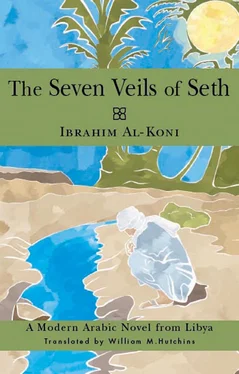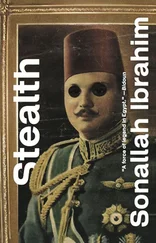After fastening the veil securely round his head, he approached the water to inspect himself in its mirror. He leaned over the surface of the submissive pool, which was flooded by the golden dusk and saw another creature there: a haughty, terrifying demon, as unfathomable as a god. Amazed, he remarked: “It’s right for desert folks to shun a person who removes his veil. It’s right for the desert’s offspring to shun a creature who disguises himself that way. The lost Law decreed correctly that any tribesman who sheds his veil should be shunned for this bare-faced disguise. It similarly ordered that any tribesman sporting the veil should be honored, even if he belongs to an alien tribe or has entered the desert as a immigrant.”
He returned to his kit and extracted from the bag a pouch wrapped in leather ornamented with cryptic symbols. He removed a suspect powder, which he examined carefully before returning it to the bag. He thrust his hand into his bag again to take out another pouch also wrapped in leather even less prepossessing than the previous piece. He untied it and stepped toward the spot where the water bubbled up. He stood on the bank and mulled over the significance of the way the light looked on the body of its beloved water. He listened carefully to the silence, which was interrupted only by the songs of the grasshoppers. He recited the charm in a loud voice: “Aid me in the struggle, master water, as I transmit my commandment to people.”
He sprinkled a secret drug onto the water. The suspect particles flashed in the light as they fell and then scattered over the water’s surface. He watched them quickly spread
— zealously, like entranced mystics — to contaminate the entire pool.
The evening celebration convened on the night the moon became full. While it was enthroned as lord in a heavenly throne, the maidens turned to poetry’s sanctuary and commended their hearts to mournful songs in their ancient longing as a message honoring the Beloved.
Their parched throats released melancholy songs endowed with a longing that was as ancient as the eternal desert and that was dispatched to honor a Beloved as ancient as the eternal sky. The women’s circle was located in an open area, which was adjacent to the houses of the oasis on the northeast and which bounded the far-stretched fields to the southwest. The men were present too but did not form a circle. Instead they sat in an impressive row and remained silent so they could — as they usually did when there was a gathering — spy on the women or the spirit world.
With their fingertips, the beauties made the drums speak; a cry emerged from the drums’ bellies. The beauties’ voices rang with longing, and a prophecy emerged from their mouths. Their fingers touched not only the drums but squeezed their own hearts.
Their throats did not release just voices but gave voice to their very spirits. Once the veil of the Beloved — enthroned in the heavens — was tinged with frenzy and blood, the men’s feet began to pummel the ground. They crawled about on their hands and knees in ecstasy. Others fell in the dirt, where in response to their longing they rolled around in a trance-like state of altered consciousness.
Meanwhile he — a stranger through all generations, the poster child of curses, the eternal man with the jenny — hiding behind a sandy hillock, began to observe the festivities surreptitiously. When the timeless rite commenced and the hearts of the young women were decimated by longing, he too quaked. He swayed and rocked with ardors beyond any that creatures of the desert had ever experienced. He released a lethal groan that could have devastated him had he not sped off in search of the vast open spaces. No one could sap the body’s strength, thrust a knife in the chest, or crush a breast the way these imbecilic, passionate ecstatics did, but he fled. He fled from the place behind the hill, from the oasis, and from the entire desert. He fled to the orchard. He did not, however, test its defenses. He circled round the place where physical space does not exist and longingly gazed at the Orchard’s Master, who had expelled him from his realm one day even before he expelled Mandam from the sacred site. For the first time he grieved at his eternal solitude and wished he had brought the she-jinni Tamuli with him so she could see what she had never seen, hear what she had never heard, and taste what she had never tasted. If that wretched woman acquired a talent or gained a gift from the spirit world and accompanied him on a trip to the horizons, she would grasp the secret. Then she would not dare chide him for criminal ignorance of the Law. She would certainly recognize that the punishment the Master of the Orchard had meted out to the jenny master was immeasurably more severe than that he inflicted upon Mandam, that child of wretchedness.
If there was anything in the desert that could excuse the beauty’s offense, it had to be her crazed hymn, which shook him and stripped away his ugly body, allowing him to flee as he did now, exploring the vast expanses of the place that no mother’s child had ever reached by any route, since it slumbers in hearts far away and can only be attained via the demon that tribes refer to as “longing.” Is this really you, ancient orchard? Is this really you, river of milk and honey? Is this really you, tree of obfuscation? Is this really you, enigmatic fruit? Is this really you, heavenly lote tree?
Then he bolted; he bolted and began running at breakneck speed. He raced as fast as the wind, indeed as fast as the jinn. He shot from his secluded spot in a second. He shot past the women’s circle in an insane leap and disappeared. He reached the fields in two seconds. He crossed over the spring in one second. He reached the sandy expanses in another second and collapsed there. He began to tremble and wail.
He heard himself weep like a child that has lost its doll.
PART I Section 2: The Messengers
It was reported by oasis people that the fool’s ancestors — like theirs — were originally nomadic and that he had settled in the oasis with other stragglers from one of the northern tribes during a lean year when drought had decimated both people and herds. These survivors had sought refuge in the southern oases as they normally did whenever drought gripped the desert for an extended period. It was also said — on the authority of these nomads — that the wretch had first appeared in a herd belonging to a slave woman who had discovered him squeezing in among a crush of livestock to nurse from the teat of a goat. He had been murmuring monotonous sounds like a chant. She recited over his head charms derived from the forgotten language of the ancestors and waited fruitlessly for his mother to appear to reclaim him. So she was forced to wrap him in her cloak and take him home, adopting him. The infant, however, did not remain hers, for children dropped outdoors by the Unknown are not born to become some tribe’s offspring but to live as strangers among the tribes. The fates entrust them to the desert race not to adopt but to cradle, since — no matter what — they will not consent to domestication or incorporation into a clan. Privy to this secret, the tribe’s elders watched compassionately as the woman raced among the tents of the tribe’s settlement, searching for her foster son, who had not returned home for days. They were certain that this alleged offspring was not like other children and that the poor woman could not have claimed him as her son even if he had emerged from her belly. What then if he had arrived through some machination of the Unknown? The proof for this was that the womb that had carried him for months had disavowed him, thrusting him into a herd, because of the despair his destiny caused her once the unknown world revealed to her that an infant the fates have chosen as their messenger will resist all attempts by people to integrate him into a family, so that not even his mother will be able to make a son of him.
Читать дальше












